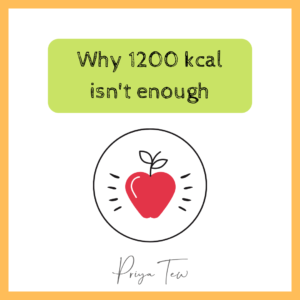Why 1200 kcal isn’t enough
Many diets prescribe just 1200 kcal as the maximum daily intake, but this really isn’t enough. When you think about it this is due to these diets being short-term fixes, they aim for you to lose weight over a short time period, which doesn’t mean you will therefore keep it off. See my previous blog on this.
Even if you were to stay in bed all day, your body still uses more than 1200 kcal just to keep you alive. Pumping blood around the body, getting rid of waste products, the act of breathing, building cells, repairing and restoring all takes energy. In fact, even toddlers need between 1000 and 1400 kcal a day, so as adult you certainly need more. That’s before you even factor in activity and digestion.
Although in simple terms, eating less calories does lead to weight loss, the reality is less simple. Less calories doesn’t mean more effective weight loss thanks to the way our bodies react to restriction. Limiting yourself to 1200 kcals for a period of time can lead to metabolic adaptation, something you may have heard referred to as “slowing down your metabolism” or “going into starvation mode”. What this means is that our bodies become accustomed to the low intake of energy and adapts to use less over the course of a day. If and when you increase your energy intake, you’ll then regain any weight lost -and likely more -as your body is unused to this new surplus.
It can also be difficult to get a balanced diet when restricting calories so much. For context, we recommend at least 5 portions of fruit and veg per day, around a gram of protein for every kilogram of bodyweight, 30 grams fibre, some fats, and a variety of minerals and vitamins from different sources. Trying to manage this when eating close to half of the recommended amount of calories is not easy! Missing out on nutrients can have a serious impact on your health. If you’re going on a low calorie diet in the hopes of losing weight in the pursuit of health, you will risk negatively impacting your health instead. A well-balanced, varied diet supports a huge range of body functions, from gut health to immunity and more.
Furthermore, eating a longer term restrictive diet means that your body diverts energy away from certain functions in order to keep your essential organs running. If you have a menstrual cycle, this may become irregular or even stop, showing hormone function is impaired adn also impacting bone health. You may also notice the health of your hair and skin decreasing, your temperature regulation not working as it should and your mood and emotional regulation being impaired. All this can come alongside fatigue, loss of muscle mass and strength, and generally feeling run down. Plus, not fuelling yourself effectively can reduce your brain power too! Is it really worth all this to lose weight a bit faster?
“But sticking to 1200 kcal is the only way I can lose weight”
If you have calorie-restricted for a long time, the thought about 1200 kcals being off-limits may seem scary. Yes, if you have restricted yourself for a long time, then it is very possible that you might gain weight, however it takes a certain amount of extra calories for the body to have the energy and the safety net to do this. If yoju do gain some weight then this can be an example of metabolic adaptation in action and not a sign that you only need 1200 kcals to live. Conversely, if you can only lose weight on such a restrictive diet, then this may be a sign either that your body is already at its preferred weight, or that your body needs to adapt to having a higher intake of food once again.
Limiting yourself to so few calories also means you are likely to be feeling hungry… and focusing on food all the time. This can hamper your ability to enjoy social situations, enjoy new foods or even cope with a change to your routine. Food shouldn’t be something that takes up so much of your headspace.
“So should I just start eating more?”
Whilst it can be daunting to start eating more, it is what your body needs. Start with making sure you are eating 3 meals and 3 snacks a day and then work on your portion sizes at each of these eating occasions. Think about the balance at each meal in terms of having carbohydrates, protein, fruit/veg and fats at each meal.
If you need support along this path then find a dietitian to work with you, they can help you plan the balance, support you with education and the science and provide moral support too. Sometimes you need that extra professional hand to help.
